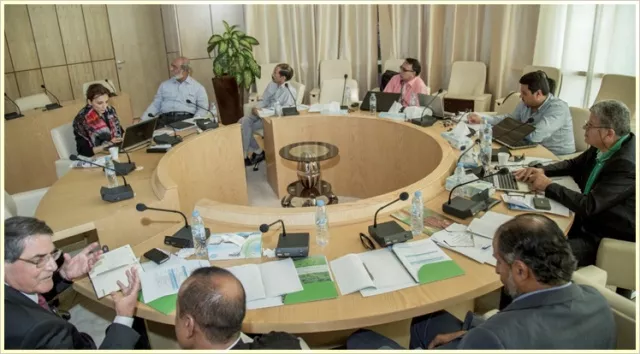Developing Effective Practices for Combating Desertification
The International Center for Biosaline Agriculture (ICBA) is hosting the annual project meeting on the IAEA coordinated project on ‘Developing effective practices for combating desertification–ARASIA–RAS5068’. The project meeting is held at the ICBA headquarters on February 15-19 and attended by participants from Iraq, Jordan, Lebanon, Oman, Syria, UAE and Yemen. The overall objective of this project is to develop effective practices for combating desertification depending on the main factors of desertification such as soil salinity, low productivity and shortages of water supply.
Drought caused by climate change coupled with considerable shortages of freshwater supply is an expanding phenomenon in all arid countries of the Middle East. Consequently, the entire area witnessed rapid advancement of desertification process over arable fertile land. Improper agricultural practices and bad management of soil and water resources converted what were previously fertile soils into depleted soils of extremely low productivity. Furthermore, most of the soils of (70% to 80%) of the total area of Lower Mesopotamian Plain (LMP) has been converted to saline alkali soils of large salts content distributed along soil profile. Therefore, a large number of farmer families abandoned their farms which resulted in sever socioeconomic impact. Accordingly, rehabilitation of such vast area and re-habituated farmers is of considerable importance to all concerned countries. Large quantities of underground brackish water available in the area may serve as a possible water resource. Agricultural practices and cropping systems may be needed to be modified for sustainable cropping of the area.
These issues are being addressed under this research project to achieve the objectives through the use of best practices for cropping of salt affected soils; utilization of saline ground water in the cropping system under sustainable form of agriculture; utilization of chemical amendments to reduce sodium hazardous effects on soil and plant; and secure reasonable market for the farm product for family settling in the area.
IAEA is represented at the meeting by Ms. Petra Salame (PMO) and Mohammed Zaman (TO). Dr. Shoaib Ismail, Lead Scientist and A/Director from ICBA will also discuss the new proposal on ‘Enhancing the use of salt-affected soils and saline water for crop and biomass production and reducing land and water quality degradation in ARASIA’.
During this event, ICBA and IAEA will also sign an agreement (Practical Arrangements) for cooperation in the areas of 'soil, water, crop and nutrient management’. This agreement would be for 5 years where ICBA would be acting as a ’Center of Excellence’ for IAEA coordinated projects on ‘crop production management related to salinity issues in IAEA member states'.
